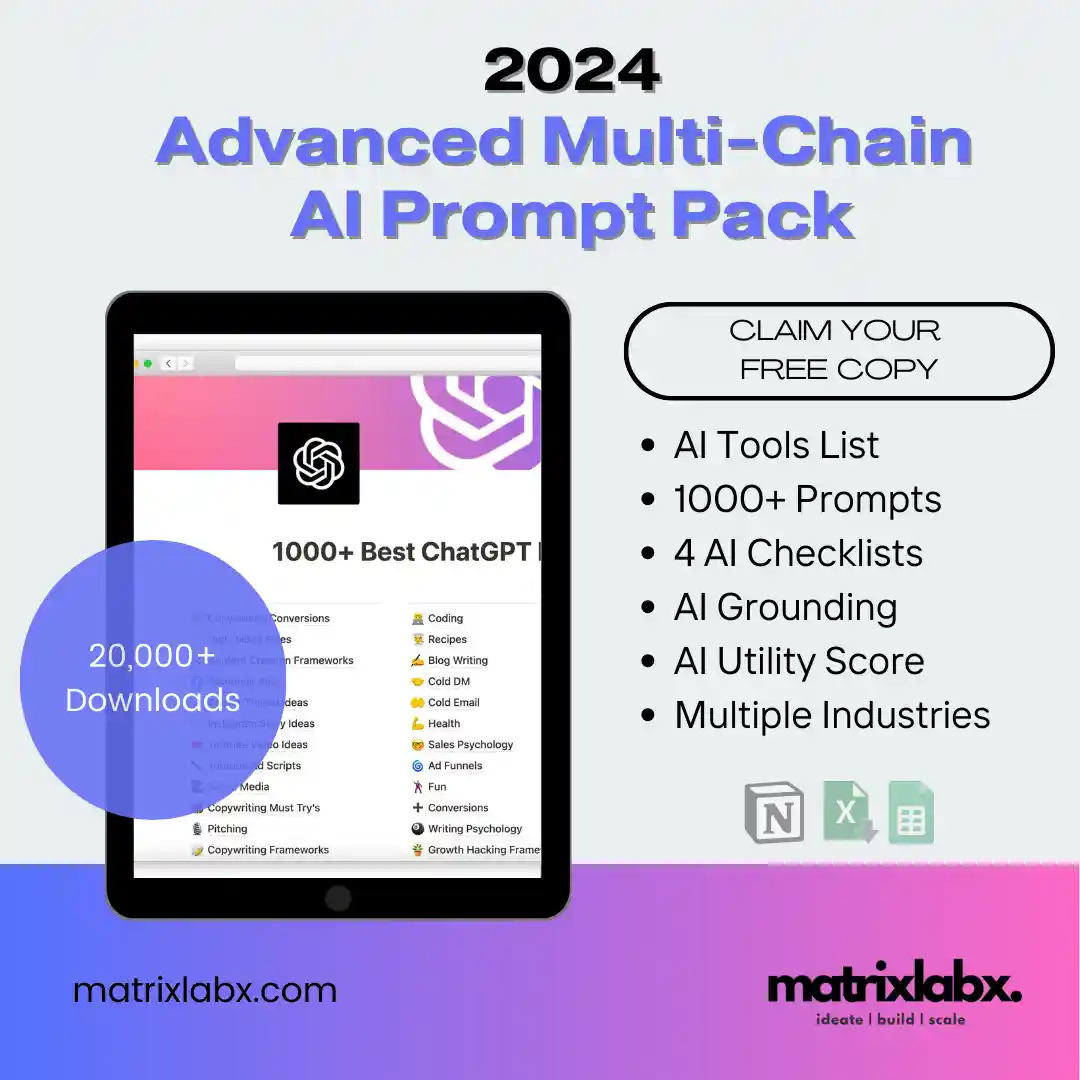Can Open AI ChatGPT Increase Sales?
Introduction to Can Open AI ChatGTP Increase Sales?
As a Sales Manager, you consistently look for innovative ways to ramp up your sales game. In the artificial intelligence (AI) era, everybody leverages technological advancements to increase output.
But have you considered how AI can impact your sales directly? More specifically, have you thought about how OpenAI’s latest technology, the GPT-3 model (or ChatGPT), can boost your numbers? Read on to find out how! AI Product Management: Why Software Product Managers Need to Understand AI and Machine Learning
OpenAI ChatGPT is a powerful language model that can automate various workflows, providing companies with several competitive advantages. Here are some of the key benefits of using ChatGPT for workflow automation:
1. Increased Efficiency and Productivity: ChatGPT can automate repetitive and time-consuming tasks, freeing employees to focus on more strategic and creative work. This can lead to significant gains in efficiency and productivity.
2. Reduced Costs: Automating tasks with ChatGPT can help reduce labor costs and the costs associated with errors and rework. This can free up resources for other investments and improve the overall profitability of the business.
3. Improved Accuracy and Consistency: ChatGPT can perform tasks with high accuracy and consistency, which can help reduce errors and improve the quality of work. This can lead to increased customer satisfaction and a stronger reputation for the company.
4. Enhanced Scalability: ChatGPT can be easily scaled to accommodate changes in workload or business needs. This makes it a versatile tool for businesses of all sizes, from small startups to large enterprises.
5. Increased Innovation: ChatGPT can free employees to explore new ideas and develop innovative solutions by automating routine tasks. This can lead to a more competitive edge for the company.
Examples of Workflow Automation with ChatGPT:
- Customer Service: ChatGPT can automate tasks such as answering customer questions, resolving issues, and providing customer support. This can improve customer satisfaction and reduce the burden on customer service teams.
- Sales and Marketing: ChatGPT can automate tasks such as generating, qualifying, and nurturing leads. This can help sales teams close more deals and improve marketing ROI.
- Human Resources: ChatGPT can automate onboarding new employees, processing payroll, and managing benefits. This can free up HR professionals to focus on more strategic initiatives.
- Operations: ChatGPT can automate scheduling appointments, managing inventory, and tracking shipments. This can improve operational efficiency and reduce costs.
By leveraging ChatGPT for workflow automation, companies can gain a competitive edge in today’s dynamic marketplace. ChatGPT can help businesses to increase efficiency, reduce costs, improve quality, enhance scalability, and foster innovation. As AI technologies evolve, the potential applications for ChatGPT in workflow automation will only continue to grow.
Understanding AI and ChatGPT
Firstly, it is essential to understand AI and the specifics around ChatGPT. AI has been in development for decades and has made significant strides recently. One such advancement is in natural language processing and generation, where ChatGPT excels. ChatGPT, a product of OpenAI, is an advanced language model designed to generate human-like text based on the input it receives. AI Marketing Plan for Manufacturing Businesses
Understanding AI, specifically in the context of models like ChatGPT, involves delving into several key areas:
- Artificial Intelligence (AI) Basics: AI is the simulation of human intelligence in machines programmed to think and learn. It encompasses various technologies, including machine learning, natural language processing, and robotics.
- Machine Learning and Neural Networks: At the core of AI models like ChatGPT are neural networks, algorithms modeled after the human brain. These networks learn from large datasets and can recognize patterns and make decisions.
- Natural Language Processing (NLP): ChatGPT specializes in NLP, which is the branch of AI focused on enabling computers to understand, interpret, and respond to human language in a way that is both meaningful and useful.
- Training Process: ChatGPT, developed by OpenAI, is trained using a Transformer neural network architecture variant. It’s trained on a diverse range of internet text. The model learns to predict the next word in a sentence and gains an understanding of language, context, and world knowledge.
- Generative Pre-trained Transformer (GPT): ChatGPT is based on the GPT architecture, which is pre-trained on a large corpus of text and then fine-tuned for specific tasks. This allows it to generate coherent and contextually relevant text based on the input it receives.
- Applications and Limitations: ChatGPT is used for various applications like conversation simulation, content generation, and information retrieval. However, it has limitations, such as a lack of understanding of personal experiences, inability to access real-time information, and potential biases in the training data.
- Ethical Considerations: The development and deployment of AI like ChatGPT raise ethical concerns, including privacy, misinformation, and the impact on employment. Responsible AI principles are crucial to address these issues.
- Future Developments: The field of AI is rapidly evolving. Future iterations of models like ChatGPT are expected to be more accurate, context-aware, and capable of handling complex language tasks with greater efficiency and ethical considerations.
In summary, understanding AI and models like ChatGPT involves a blend of technical knowledge in machine learning and NLP, awareness of their applications and limitations, and an understanding of the ethical implications of deploying such technologies.
But how does this directly increase sales?

Optimized Customer Interaction
The most direct way ChatGPT can improve your sales numbers is through optimized customer interaction. Customers today expect readily available, high-quality service at all times.
Optimizing Customer Interactions: A Prompt Engineer’s Guide
As a prompt engineer, I’m all about crafting the perfect prompts to unlock the potential of large language models. Today, let’s turn our focus towards a crucial aspect of any business: customer interaction. Here’s how we can optimize it with the power of prompts:
1. Understand your customers:
- Prompt: Analyze customer reviews, social media conversations, and support tickets to identify recurring themes, emotions, and pain points. What are they saying? What are they feeling?
- Output: Customer profiles: detailed personas capturing demographics, motivations, and challenges.
2. Craft personalized experiences:
- Prompt: Based on customer profiles, generate personalized product recommendations, email greetings, and chatbot responses. Speak their language, address their needs.
- Output: Engaging and relevant interactions that resonate with each individual.
3. Anticipate their needs:
- Prompt: Analyze past interactions and predict future questions, concerns, or roadblocks. What might they struggle with next?
- Output: Proactive support: offer solutions, answer FAQs, and guide them through potential hurdles before they even arise.
4. Facilitate seamless communication:
- Prompt: Train language models to understand natural language, interpret intent, and respond accurately and empathetically. No more robotic replies or frustrating misunderstandings.
- Output: Smooth, natural conversations that build trust and foster positive relationships.
5. Gather continuous feedback:
- Prompt: Design surveys and feedback forms beyond “satisfied/dissatisfied.” Ask open-ended questions, encourage suggestions, and actively listen.
- Output: Valuable insights to continuously improve the customer journey and address any emerging concerns.
Bonus prompt: Experiment with different creative formats! Generate poems, scripts, or even personalized songs to express appreciation, celebrate milestones, or simply bring a smile to your customers’ faces.
Remember, the best prompts spark curiosity, encourage empathy, and turn customers into loyal brand advocates. So, let’s experiment, get creative, and optimize customer interactions for a future filled with happy customers and thriving businesses!
Optimize customer interaction for healthcare institutions:
ChatGPT for Optimized Customer Interaction in Healthcare

In the healthcare industry, providing exceptional patient care extends beyond clinical expertise. It encompasses fostering positive patient interactions, addressing concerns promptly, and ensuring a seamless patient experience. ChatGPT, a large language model powered by artificial intelligence (AI), can revolutionize customer interaction in healthcare institutions, enhancing patient satisfaction and improving overall healthcare outcomes.
Streamlined Patient Communication
ChatGPT can be a virtual assistant, facilitating efficient and personalized communication between patients and healthcare providers. It can handle routine inquiries, schedule appointments, provide updates on test results, and address medication-related questions.
This automated support can alleviate the burden on administrative staff, freeing them to focus on more complex tasks.
Enhanced Patient Engagement
ChatGPT can personalize patient interactions, tailoring responses to individual needs and preferences. It can provide educational materials, answer questions about specific conditions, and offer emotional support. This personalized engagement can foster trust, improve patient compliance with treatment plans, and enhance overall satisfaction.
Multilingual Support for Diverse Patient Populations
ChatGPT’s ability to translate languages breaks down communication barriers, ensuring patients from diverse backgrounds receive the care they need. It can provide support in multiple languages, addressing cultural nuances and ensuring patients understand their medical conditions and treatment options.
Real-time Feedback and Analytics
ChatGPT can gather real-time patient feedback, providing valuable insights into their experiences and satisfaction levels. This feedback can be used to identify areas for improvement, enhance patient-centered care initiatives, and measure the effectiveness of communication strategies.
Integration with Existing Systems
ChatGPT can seamlessly integrate with existing healthcare information systems, providing a centralized patient communication and data management platform. This integration can streamline workflows, improve data accessibility, and enhance patient care coordination.
Examples of ChatGPT Applications in Healthcare
- Virtual Patient Concierge: ChatGPT can act as a virtual patient concierge, answering questions about services, scheduling appointments, and providing directions to facilities.
- Post-discharge support: ChatGPT can provide personalized post-discharge support, reminding patients about medication schedules, answering questions about recovery, and monitoring for potential complications.
- Mental Health Support: ChatGPT can offer emotional support and guidance to patients with mental health conditions, providing a safe and confidential space for communication.
- Clinical Trial Recruitment: ChatGPT can help recruit patients for clinical trials, provide eligibility screening, answer protocol questions, and schedule appointments.
ChatGPT: A Transformative Tool for Healthcare Customer Interaction
ChatGPT, with its ability to provide personalized, efficient, and multilingual communication, has the potential to revolutionize customer interaction in healthcare institutions. ChatGPT can improve patient satisfaction, clinical outcomes, and a more patient-centered healthcare experience by enhancing patient engagement, streamlining communication, and gathering real-time feedback.
By integrating ChatGPT into your customer service and sales processes, you can provide instant, 24/7 support to your customers and prospects. You can answer queries, handle complaints, and guide customers through your services or products, removing any barriers preventing a customer from closing a deal.
Personalized Service at Scale with Open AI ChatGPT
Personalization is a significant driving factor for sales today. Customers expect businesses to understand their needs and provide services tailored to them. However, it’s challenging to offer such personalization at scale. With AI algorithms like ChatGPT, you can analyze customer data and behavior to provide personalized product recommendations or communication, leading to better client interaction, thus boosting your sales. How to Use AI Digital Marketing to Transform Your Marketing Results
Increasing Efficiency and Reducing Costs
Efficiency is critical in sales. The quicker the sales cycle is, the better. ChatGPT can answer customer inquiries instantaneously, speeding up the sales cycle considerably. Furthermore, by automating tasks traditionally overseen by sales reps, you free up their time to focus on high-value activities.
Using ChatGPT is also cost-effective. Despite the initial investment, leveraging such a technology can be highly profitable in the long run as it can handle a large volume of work without the associated human capital costs.
Data Analysis and Insight with Open AI ChatGPT
Another way ChatGPT – as a part of AI – can help improve sales is through its data analysis capabilities. AI can process vast amounts of data much faster and more accurately than any human, providing you with insights into customer behavior and preferences and even predicting future buying trends. All these can serve as crucial data points in crafting effective sales strategies.

Final Thoughts about Open AI ChatGPT
In today’s competitive business environment, leveraging AI, particularly technologies like ChatGPT, is no longer a luxury but a necessity. With the potential to drastically increase sales, optimize customer support, personalized service at scale, and reduce cost, ChatGPT can be a game-changer in your sales department. Its ability to handle vast amounts of data and provide actionable insights can further inform your sales strategies. As a Sales Manager, adopting emerging technologies like ChatGPT can set you ahead of your competition and significantly boost your bottom line.

